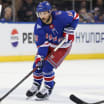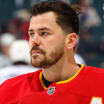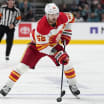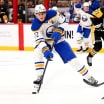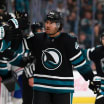Legendary hockey reporter and analyst Stan Fischler writes a weekly scrapbook for NHL.com. Fischler, known as "The Hockey Maven," shares his knowledge, humor and insight with readers each Wednesday.
Today, he recounts the brief NHL career of goalie Jack Gelineau, the 1949-50 Calder Trophy winner with the Boston Bruins, who traded in his stick and pads for a desk at an insurance agency after two seasons in the League.
Gelineau went from Calder Trophy winner to insurance agent
Goalie was NHL's top rookie with Bruins in 1949-50, but left League for business career
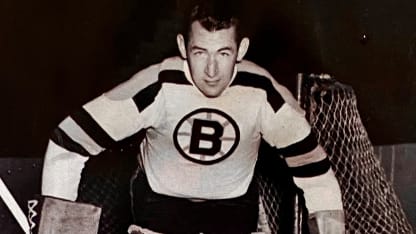
By
Stan Fischler
Special to NHL.com
From 1949 through 1951,
Jack Gelineau
looked like he was on his way to NHL stardom with the Boston Bruins. Then poof, he was gone -- off to life behind a desk with an insurance company.
Here's how it happened.
Gelineau was a World War II hero. While serving with the Royal Canadian Air Force, he survived a 1944 plane crash that almost cost him his life. Gelineau not only saved himself, he rescued an injured crew member from a burning aircraft that was loaded with ammunition.
That bit of heroism earned the Toronto native a British Empire Medal for gallantry. "Nothing Jack could do after that could be so demanding," hockey historian Andrew Podnieks wrote.
After returning from the war, Gelineau spent four seasons at McGill University, where he was voted athlete of the year in 1948. He was 40-16 with one tie as a goalie but excelled in other sports as well and even earned a tryout with baseball's Boston Red Sox.
However, hockey was Gelineau's first love. At age 24, he joined the Bruins while completing his bachelor's degree at McGill, becoming the first goalie in three decades to play in the NHL while attending college.
Gelineau went 2-2-0 with a 3.00 goals-against average in four games, enough to convince the Bruins that he could be their goalie of the future. The Bruins sent 33-year-old
Frank Brimsek
to the Chicago Black Hawks (then two words) on Sept. 8, 1949, and put their trust in Gelineau.
A lesser man might have found succeeding a local hero such as "Mister Zero" a daunting task. But after what he'd gone through during the war, Gelineau wasn't fazed. Though the Bruins dropped to fifth place in 1949-50 after finishing second in 1948-49 with Brimsek in goal, Gelineau's performance (22-30 with 15 ties, 3.28 GAA, three shutouts in 67 games) was good enough to win the
Calder Trophy
as the NHL's top rookie.
He was even better in 1950-51, going 22-30 with 18 ties, a 2.81 GAA and four shutouts to help the Bruins return to the Stanley Cup Playoffs by finishing fourth. His natural athleticism and stamina were impressive, as were his self-assurance and feeling of independence.
After two impressive seasons, Gelineau was confident enough to believe that he was due for a raise. But general manager Art Ross didn't agree. Gelineau showed up when training camp opened at Hershey, Pennsylvania, in the fall of 1951, then disappeared. With Ross adamant about how much the Bruins would pay (this was an era when some top players barely reached salaries of $10,000), Gelineau decided to start a new career -- in the insurance business.
In an October 1951 interview with Len Bramson, a reporter for The Hockey News, Gelineau explained why he did what he did.
"We failed to see eye to eye, and I would not sign for anything less than what I asked for and what was promised me when I turned pro two years ago," he said. "I would love to play hockey this year, but it would have to be for what I'm worth."
Instead, Gelineau took a job with Sun Life Insurance in Montreal, a position that also allowed him to play in the Quebec Senior Hockey League. He felt he had the best of both worlds.
"I have a good job with better earning potential than hockey," Gelineau said. "I cannot take a chance each year waiting until August rolls around to find out if I'm going to be offered a 30-week guarantee to play the game of hockey."
Ross also moved on, signing veteran goalie Jim Henry, who helped the Bruins qualify for the playoffs in each of the next four seasons.
Gelineau did get one last taste of the NHL. In 1953-54, Chicago signed Gelineau, now 29. He played two games with a last-place team, lost them both and allowed 18 goals before going back to the insurance business and his goalie gig with Quebec. After the 1954-55 season, he forsook hockey and stuck with insurance for good.
The two-year Bruins wonder goalie celebrated his 74th birthday on Nov. 11, 1998. and died the next day. He was buried at Last Post Fund National Field of Honour in Pointe Claire, Quebec.

